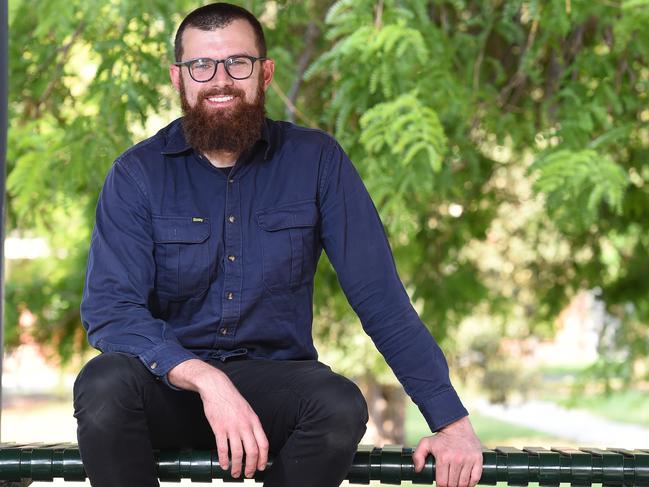Simple steps you can take towards early retirement
It might seem like a long way off for many Australians, but there are some simple steps you can take now to help you retire sooner.
Money
Don't miss out on the headlines from Money. Followed categories will be added to My News.
Relaxing on sandy white beaches, playing rounds of golf and jetsetting overseas is what many Australians hope for once they enter retirement.
But the reality is our ageing population needs plenty of money to do that before they finally hang up their work boots.
Ideally they enter retirement debt free and with a healthy bundle of savings in their back pockets.
There’s no fixed retirement age in Australia with some people now working well past their 60s.
And not everyone is eligible for the age pension – it’s based on an assessment of your income and includes your financial assets such as superannuation – the pension becomes available at age 65.5 and rises to 67 by 2023.

For those who have a healthy pot of superannuation to dip into, the preservation age of when you can start accessing it is between 55 and 60 depending on when you were born.
The total pool of superannuation in Australia has hit $3 trillion and the median balanced option returned 13.8 per cent for the 12 months, according to research house SuperRatings.
But for some the idea of retiring early is extremely appealing, there’s even a lifestyle movement called the FIRE movement (Financial Independence Retire Early), with some people setting themselves up so they can stop working in the 30s or 40s.
While that’s not realistic for most of us, here are some important things to consider if you do plan to retire sooner.
SUPERANNUATION
This is the giant pot of cash that many of us will be relying on once we stop working.
Latest statistics from the Association of Superannuation Funds of Australia showed the average savings at retirement needed for a comfortable lifestyle is $640,000 for couples and $545,000 for singles.
This is based on owning your home outright and being relatively healthy.
It means you can have top level private health insurance, own a reasonable car, replace your kitchen and bathroom that’s more than 20 years old, have domestic and occasionally international holidays and wear good clothes.
Industry Super Australia’s chief executive officer Bernie Dean said tipping extra cash into super sooner rather than later made a huge difference.
“The money you put in now accelerates significantly through the power of compound interest,” he said.
“Every dollar you put into super, rule of thumb, is worth $4 when you retire and that’s a good investment vehicle.”
ISA figures found if a 30-year-old tipped in an extra $25 a week into super via salary sacrifice, based on average interest calculations of 5.7 per cent it could equate to another $60,000 in retirement.
Figures from one of the nation’s largest super funds AustralianSuper showed about 11 per cent of members (239,000) made salary sacrifice or voluntary contributions in 2019 totalling $3.2 billion.
This is an average contribution of $13,389.
The fund’s group executive of membership Rose Kerlin said, “small regular amounts added to your super can make a big difference”.
“If you are able to take home a little less pay, salary sacrificing straight into your super account could be something you might want to consider,”, she said.
“Before making an after-tax or salary-sacrificed contribution it’s important that you are aware of any contributions caps that apply.”
But Mr Dean warned Australians to ensure their other financial affairs were in order before focusing solely on super, such as paying down debt or wasting money on discretionary spending.
“Uber Eats is really attractive and it’s a clever thing for people who are busy, but if you can forgo that Uber Eats once a week and cook yourself a home-cooked meal that $40 or $50 could make a huge difference if you whack that into super,” he said.
To tip extra in Mr Dean said it’s best to contact your super fund directly or your employer to set up direct debits from your salary.
SHARES/INVESTMENTS
The Australian Stock Exchange’s top 200 companies – the S & P/ASX200 – recently reached unprecedented highs and surpassed the 7000 point mark for the first time ever.
Global markets have also been positive after news of an agreement between the US and China which could put an end to a long-running trade war.
Full-time mechanic Marcus Allingham, 29, has a strong interest in investing in shares which could allow him to retire earlier later in life.
“If you’re not cashflow positive you can’t really do anything,” he said.
“So I started putting my money into a portfolio of investments which is mostly stocks and some through (automated investment advice platform) Six Park and also some property, bonds and infrastructure.”
Mr Allingham is yet to buy his first home but said it might be on the agenda in a few years time depending on whether he starts a family with his partner.

He was turned off leaving his cash savings in the bank because of the low-rate interest rate environment where returns on deposits have hit a paltry one or two per cent.
“My investment horizon is long-term, then something that is a bit more volatile like stocks does make sense,” Mr Allingham said.
Six Park’s director of business development Ted Richards said when investing “it’s not just about picking one basket and putting all your eggs in that basket”.
“It’s about creating you own globally-diversified portfolio,” he said.
“What we’ve seen in recent times is most asset classes have performed quite well but it’s having an investment that’s resilient to withstand other parts of the market too.”
Mr Richards encouraged investors to make sure they are paying low fees and understand the risk they are taking on.
“It’s all about harnessing the power of returns as early as you can to get your nest egg growing rather than just picking one company, one stock or even one asset class,” he said.
“Have diversification and keeping fees low are two things that can really have a major output in terms of what your final investment may look like.”
DEBT
Being burdened with debt in retirement can be a huge stress that retirees don’t need.
Rising Tide Financial Services’ director Matt Hale said ideally Australians should have minimal debt once they stopped working.
“If you have an owner occupier home loan this would be the first debt you should extinguish,” he said.
“Whereas if you have an investor home loan as long as it’s not crippling you, you are hopefully still getting the capital growth from it, but I would be channelling money into my principal place of residence debt.”

Interest rates on home loans are at record lows and they could fall even further – some loans are within the high two per cent or low three per cent range.
But as for debt on personal loans and credit cards, Mr Hale said this should be avoided.
Many personal loans are attracting interest rates of at least 10 per cent, while many credit cards are above 20 per cent.
“Whatever debts you have, line them up and the one with the highest interest rate first, really focus on paying that off,” Mr Hale said.
Having a house paid off means there’s no worry about being able to afford mortgage repayments or rent expenses once you stop working.
Originally published as Simple steps you can take towards early retirement



